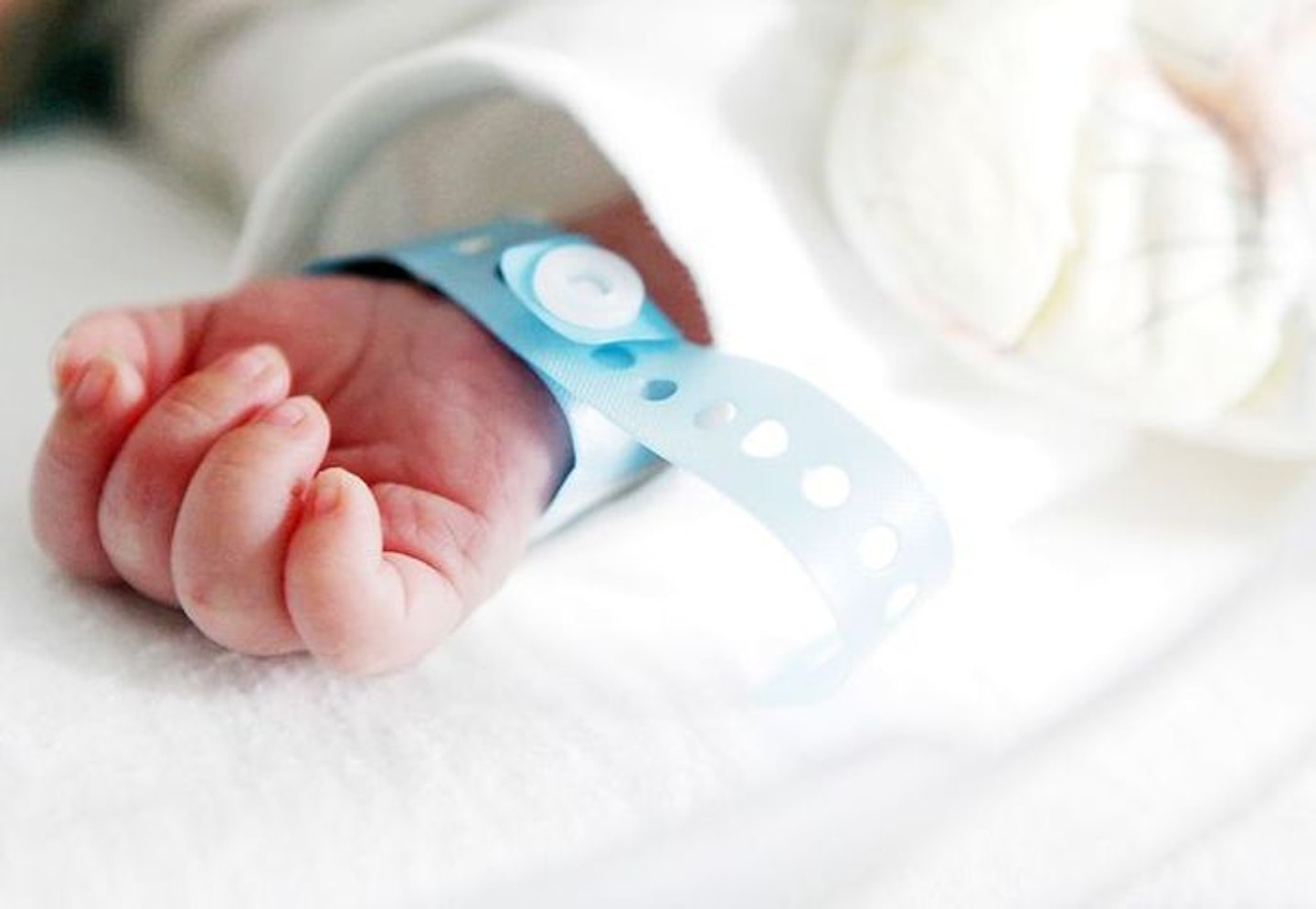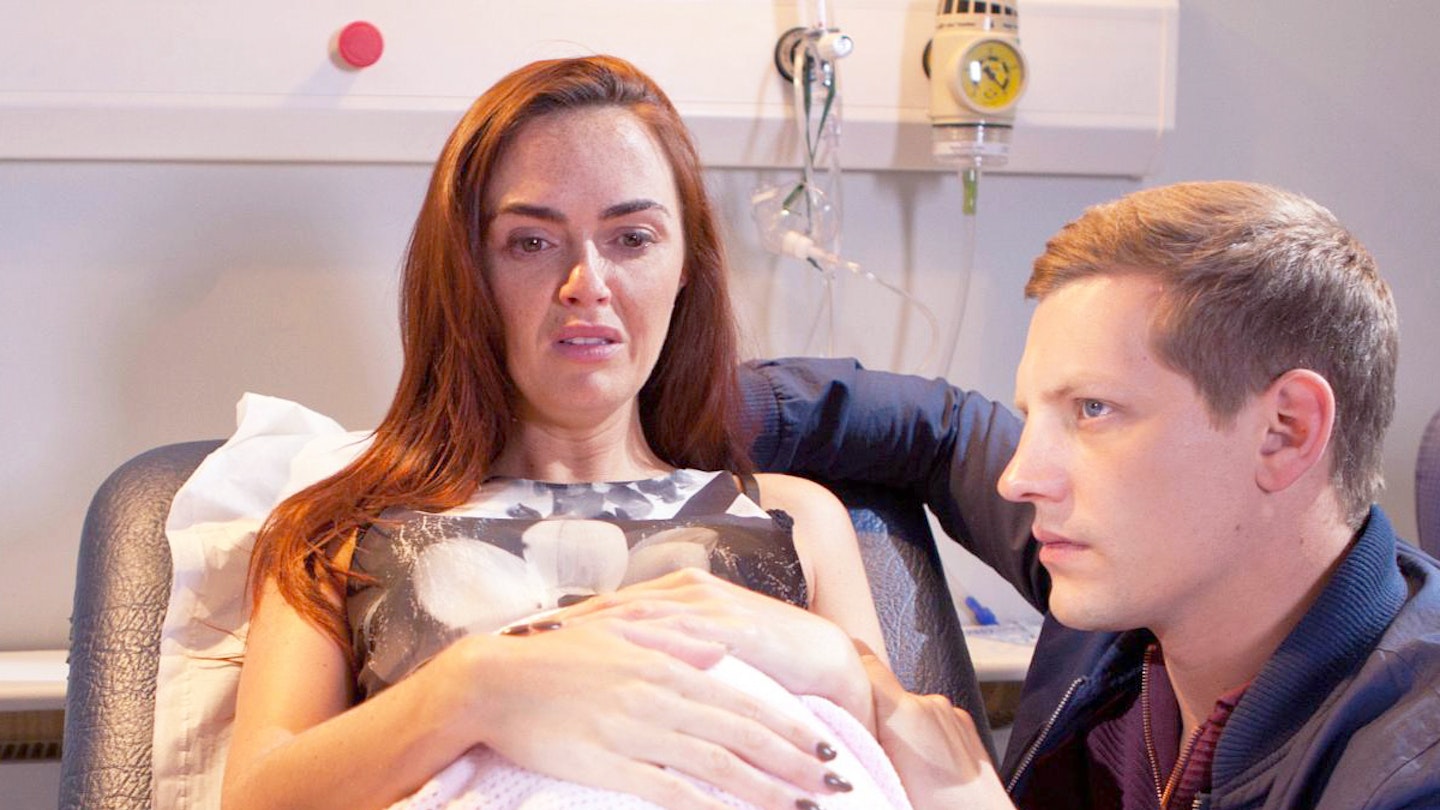What causes stillbirth? How can you reduce your risk of having one? And what happens if your baby is born sleeping? We answer all of your questions about stillbirth.
According to statistics, a staggering 3,500 babies are stillborn in the UK every year.
But it is still a rarely talked about topic among British people.
It's not something you ever want to even think about happening to you, but we've tried to answer your most pressing questions about what stillbirth is and what causes it.
WATCH: Denise Robertson's Advice On Coping With A Stillbirth | ITV/ This Morning
What is stillbirth?
Stillbirth is when a baby is sadly born dead anytime after 24 weeks of pregnancy. The loss of a baby before the 24th week of pregnancy is called a miscarriage.
How often does stillbirth happen in the UK?
According to Tommys.org, around 3,500 babies are tragically stillborn in the UK each year.
What causes stillbirth?
Sometimes, there isn't an obvious explanation for a stillbirth to occur, and they can happen in otherwise healthy babies without an obvious cause.
While the cause of around 30% of stillbirths are unknown, there are some conditions that can lead to a baby being born sleeping.
Problems with the placenta, which nourishes your baby throughout your pregnancy, can lead to a stillbirth in about two-thirds of cases. In a placental abruption, the placenta separates too soon from the uterine wall.
These, according to the NHS, include:
-
A problem with the umbilical cord, which attaches the placenta to the baby's tummy button. This could cause the cord to slip down through the entrance of the womb before the baby is born (cord prolapse), or become wrapped around the baby and knotted.
-
Intrahepatic cholestasis of pregnancy (ICP) or obstetric cholestasis – a liver disorder during pregnancy characterised by severe itching.
-
Pre-eclampsia - a condition that causes high blood pressure in the mother.
-
A birth defect or congenital abnormality.
-
Environmental factors - such as exposure to pesticides or carbon monoxide.
-
Intrauterine growth restriction (IUGR) - this means that the foetus grows too slowly, putting the foetus at risk of dying from lack of nutrition.
-
Infections in the mother that also infects the baby – this could be: rubella, the flu, group B streptococcus, herpes, chlamydia, Lyme disease, klebsiella, enterococcus, haemophilus influenza, and mycoplasma or ureaplasma. According to the NHS, around one in 10 stillbirths are caused by an infection.
READ MORE | 10 beautiful stillbirth & miscarriage poems to help grieving mothers

How can I prevent stillbirth?
Not all stillbirths can be prevented. However, there are some things you can do to reduce your risk.
These include:
-
Quitting smoking
-
Avoiding alcohol and drugs during pregnancy
-
Limiting your caffeine intake during pregnancy
-
Avoiding certain foods during pregnancy, such as; raw fish or shellfish, soft cheeses, raw eggs, unpasteurised milk, pâté (including vegetable pâté), raw meat, undercooked meat, cold cured meats (such as salami and Parma ham), liver pâté or liver sausage
-
Avoiding high-dose multivitamin supplements, fish oil supplements, or any supplements containing Vitamin A
-
Washing fruit, salad and vegetables before consumption, to remove all traces of soil (which may contain toxoplasmosis)
-
Making sure you're a healthy weight before falling pregnant
-
Reporting any tummy pain or vaginal bleeding that you have to your midwife on the same day
-
Reporting any itching to your midwife
-
Reporting any rashes to your midwife
-
Being aware of your baby's movements and reporting any concerns you have to your midwife straight away
-
Attending all your antenatal appointments so that midwives can monitor the growth and wellbeing of your baby
What are the symptoms of a stillbirth?
Many women who suffer a stillbirth do not notice any warning signs or changes in their pregnancy, and unfortunately, there is usually nothing that can be done to save their baby.
However, there are some things that you should look out for during your pregnancy.
Your baby's movements
A baby's movements are a sign of their wellbeing. Whilst there are no set patterns of what is normal for an unborn baby as every baby is different, it is important to get to know their individual pattern. Your baby's movements will gradually increase throughout your pregnancy up to around 32 weeks when they will stay the same until birth.
Kicks Count, an organisation who aim to raise awareness of babies' movements in pregnancy, explain: "Two out of three mums who have a stillbirth say they noticed their baby's movements slow down beforehand. It is therefore important that all cases of reduced movement are reported to your midwife or maternity unit."
They add: "It is not true that babies slow down as you reach the end of pregnancy."
If you notice your baby's movements have changed, call your midwife of maternity unit straight away - and never go to sleep ignoring a change of movement.
Leaking fluid
If you experience any leaking of fluid from your vagina during your pregnancy, you should contact the hospital immediately and go in to be monitored. It could be your waters breaking early or a sign of infection of the womb.
Vaginal discharge
You should report any discharge from your vagina which is smelly, and any colour other than white, as it may be a sign of an intrauterine infection. Infections can weaken the bag of membranes around the baby, cause an infection inside the womb or make your waters break.
Call your midwife, GP or hospital if you notice anything like this - they will need to take a swab and check for infection.
READ MORE | Stillbirth advice: How to be there for someone who has lost a baby

When should I call my midwife?
Kicks Count have published the warning signs every pregnant woman should take notice of.
They advise that you immediately call your midwife, GP or hospital:
-
If you notice a change in your baby's normal movement patterns
-
If you have any itching or a rash
-
If you have a temperature or fever
-
If you have any pain including headaches
-
If your vision becomes blurred or you see colours or patches
-
If your hands or feet become swollen or painful
-
If you have any fluid loss or bleeding
-
If you have pain passing urine
-
If you have a "bad feeling" or feel uneasy in anyway
How is a stillbirth confirmed?
If it's suspected that your baby has died, a midwife or doctor may try to listen to your baby's heartbeat with a handheld Doppler device.
An ultrasound scan will also be carried out to check your baby's heartbeat - and a doctor will usually be asked to confirm that the baby has died by carrying out an ultrasound scan.
If you are on your own, please do ask for someone close to come and support you.
WATCH: Kym Marsh Opens Up About Her Miscarriage Heartbreak | ITV/ This Morning
Am I at risk of stillbirth?
There are a number of things that may increase your risk of having a stillborn baby, including:
-
Having twins or a multiple pregnancy
-
Having a baby who doesn't reach his or her growth potential in the womb
-
Being over 35 years of age
-
Smoking while pregnant
-
Drinking alcohol while pregnant
-
Using drugs while pregnant
-
Being obese (having a body mass index (BMI) over 30)
-
Being severely underweight
-
Having a history of thrombosis or pulmonary embolism
-
Having a pre-existing physical health condition, such as epilepsy or diabetes
-
Having high-blood pressure
-
Having an infection (see more about this above)
What will happen next?
The staff will usually carry out tests to check your health, and to try to find the cause of your baby's death.
This will be done by testing your blood and urine and may take vaginal swabs.
However, while these tests are important, it may not be possible at this stage to find out why your baby has died.
Will I still have to go through labour if my baby is stillborn?
If your baby dies before being born, there are still many decisions you will need to make about your little one's birth.
You will usually give birth naturally unless there are medical reasons that mean you need a caesarean section. This is safer for the mother.
More often than not, labour will begin on its own within one to two weeks. However, many doctor and midwives will offer medication to induce labour, as waiting for it to begin naturally increases the chance of the baby deteriorating in the womb.
This can affect how the baby looks when he or she is born, and can make it more difficult to find out what caused the death.
Here are the most common options.
Natural labour
If there's no medical reason for your baby to be born straight away, it may be possible to wait for labour to start naturally.
Regular blood tests will be needed after 48 hours, to monitor the mother's health.
Induced labour
You may need to be induced to start the labour off.
This can be done by inserting a pessary tablet or gel into the vagina, or by swallowing a tablet. Sometimes, medication is given through a drip into a vein in the arm.

Will I be able to see my baby if they are stillborn?
Yes, of course.
You can decide whether you'd like to see your baby straight away after birth, or whether you'd like the midwife to clean and wrap the baby in a towel first, or if you'd like to see the baby at a later stage.
Sands, the Stillbirth and Neonatal Death Support charity, advise: "If you are not sure about seeing your baby or are anxious about how your baby will look, you could ask the midwife or nurse who is caring for you to tell you what your baby looks like when he or she is born.
"Or you could ask to see a photo first. You could also ask the midwife or nurse to wrap or wash and dress your baby before you see him or her.
"If your baby has a visible abnormality, he or she can usually be carefully wrapped or dressed so that the abnormality isn't obvious."
Another option to consider is a cuddle cot.
What is a cuddle cot?
If a mother has suffered a late miscarriage or stillbirth, or if a baby has passed away later on after the birth, the family may want to use a cuddle cot to spend more time with and get to know their baby before the body is taken away.
Erica Stewart, Bereavement Support and Awareness Specialist at Sands, told us: "A cuddle cot is an extension of time, allowing bereaved parents the chance to make memories in hospital after their baby has died.
"When a baby dies in hospital, whether it's a stillbirth or a neonatal death, parents are now offered choices as to what they can do with their baby. It enables parents to spend longer with their baby before the baby's appearance starts to change."
Can I take my baby out of the hospital?
Sands, the Stillbirth & Neonatal Death Charity, explain: "Some parents decide to take their baby out of the hospital for a short while. They may take their baby home or to a place that has special meaning for them.
"There is no legal reason why you should not do this (except in cases when a coroner or procurator fiscal has ordered a post mortem)."
You are also able to take a cuddle cot home with you in some cases, if your hospital has one available.
Erica Stewart said: "It allows parents to spend longer with their baby without feeling rushed, as they may do whilst in hospital. They also might worry that the baby's appearance is going to change so they think they only have one or two days.
"The parents don't have to keep the baby in the cuddle cot – they're allowed to take the baby out and take photos, maybe a lock of hair. It can also be an opportunity for other family members like other children or grandparents or even close friends to meet the baby as well.
"A lot of parents like to take their baby home because that's what they would have done in other circumstances. It gives them a chance to nurture their baby as they would have done – they can dress their baby, cuddle their baby, put their baby back in the cot, meet other family members."
Can I take photos of my baby?
It may seem strange to take photographs of your little one, but many parents of stillborn babies have said that these memories and keepsakes can become precious.
Speak with the staff caring for you about what they advise; they will often be able to offer the opportunity to create memories, such as photographs, scan pictures, a cot card, or handprints.
Studies have shown that having mementos such as these often help mothers to deal with the grieving process.
If neither of you wants photos now, you could ask the midwife or nurse to take some and to keep them in the mother's hospital notes. Hospitals are now encouraged to store keepsakes such as photos so that the mother can ask for them if she changes her mind.
Will there be a post-mortem?
Parents of a stillborn baby will be asked whether they want their baby to have a post mortem, in a bid to try and find the cause of the stillbirth - or, at the very least, rule out some causes.
This may be helpful if you are planning future pregnancies.
Will I need to register the birth?
If your baby was born after 24 weeks, you will need to register the birth. A birth certificate can be a therapeutic thing to have, as you then have official documentation that your baby existed, and some bereaved parents find that comforting.
However, you only have 42 days to do so in England and Wales, and 21 days in Scotland.
In Northern Ireland, you do not have to register the birth at all - although, if you wish to, you have up to three months to do so.

Can I still name my baby?
It is completely up to you whether or not you wish to give your little one a name. Doing this will help to give your baby his or her own identity, and can make it easier for you to talk about them later on.
In fact, many mothers of sleeping babies have said that they find it most comforting when friends and family refer to their angel by name.
However, if you choose not to name your baby on the certificate, it cannot be added at a later date, so consider this choice before registering the birth.
Can you still take maternity leave if you've had a stillbirth?
While money matters may pale into insignificance after the tragedy of a stillbirth, you are still entitled to maternity benefits and entitlements.
Generally speaking, you're entitled to a total of 52 weeks leave. You'll get maternity pay while you're off work for a maximum of 39 weeks (providing you've been working for long enough), in the form of Statutory Maternity Pay or your employer's own scheme. You must claim within 28 days of the death.
It is important to wait until you are ready, but do make sure that you speak to your employer about maternity pay and leave.
Will I need to make funeral arrangements?
A baby who is stillborn after 24 weeks of pregnancy must by law be formally buried or cremated.
Many hospitals will offer to arrange a funeral for you free of charge or you can make your own arrangements. Most funeral directors offer a simple funeral service for babies free of charge.
Will I be able to have a healthy baby after going through a stillbirth?
Many women who have a stillbirth will be able to have a healthy baby in their next pregnancy.
However, it may help to prevent future problems if the cause of the stillbirth is investigated.
Where can I find support to help me through the grieving process?
You can phone the Sands helpline on 020 7436 5881.
Sands helpline opening hours:
Monday to Friday: 9.30am – 5.30pm
Tuesday and Thursday evenings: 6pm – 10pm.
Have you or a loved one ever suffered a devastating stillbirth? Let us know over on Facebook and Twitter.
READ MORE...
Stillbirth: One mum shares her heartbreaking story of losing her first child
Mum endures stillbirth, donates her breastmilk to babies in need
Kym Marsh opens up about devastating Coronation Street stillbirth storyline and losing her own child
